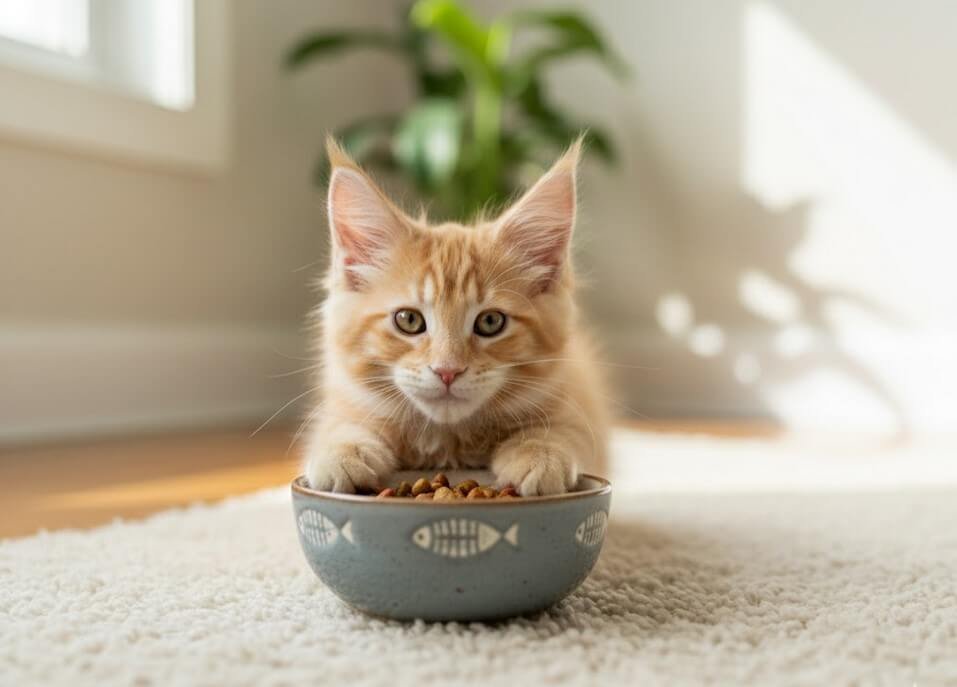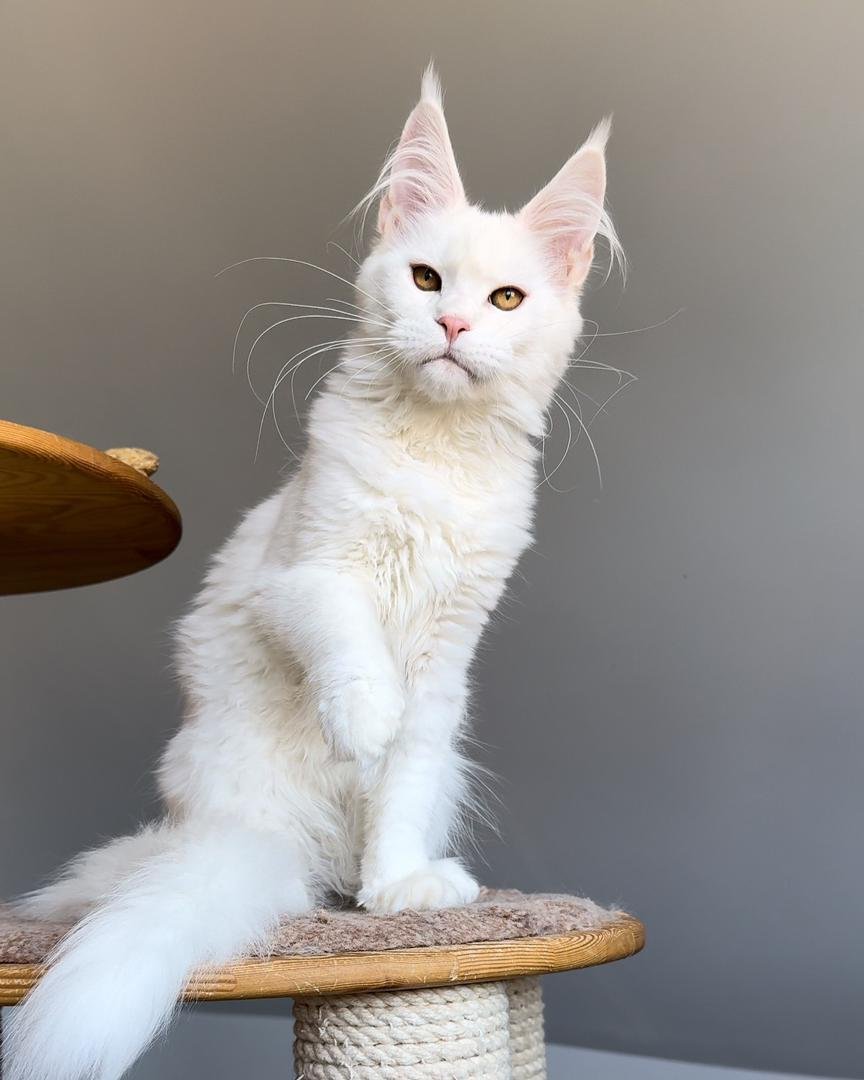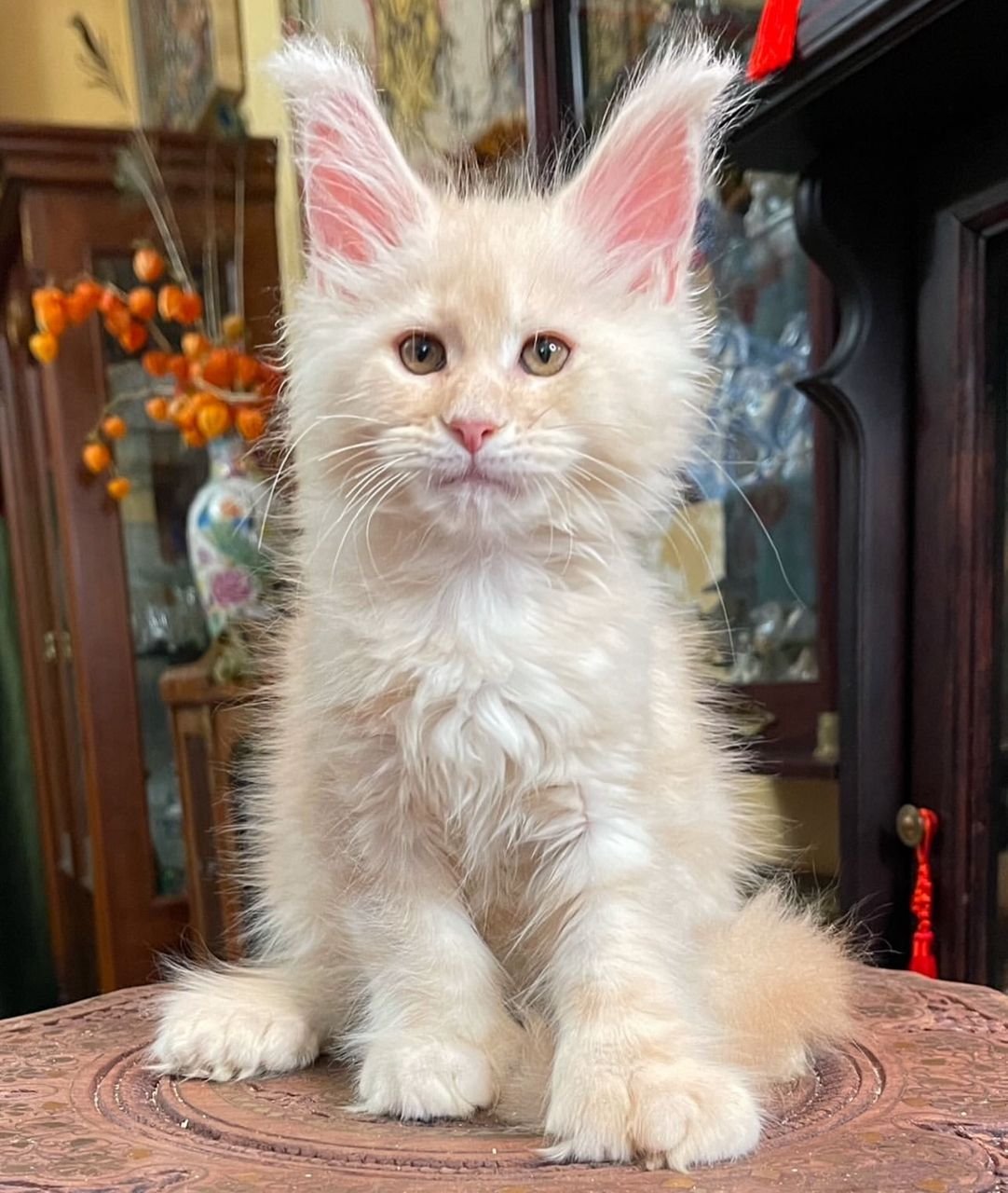Maine Coons are often called the “gentle giants” of the cat world. This breed is very popular for their luxurious coats, loving personalities, and giant size. Nonetheless, their attractiveness and charisma entail a minor amount of responsibility. Properly caring for a Maine Coon ensures they live a long, happy, and healthy life.
Maine Coon care is a vast topic and in this complete manual we will touch on all aspects of it, including grooming and feeding to common Maine Coon health issues and emotional well-being.
If you are a novice owner or an experienced cat lover this guide will give you a step-by-step direction to provide your pet with the highest quality care.
A Brief Introduction to Maine Coons
The Maine Coon is a natural breed that is considered to be one of the oldest cats in North America, and it is believed to have been developed in Maine.
According to the story, these cats were the result of a cross between long-haired cats brought to the region by sailors and local short-haired cats. The resulting breed was able to live through the harsh New England winters thanks to their thick and water-repellent fur, tufted ears, and bushy tails – these being some of the traits that the cats evolved with to survive in such cold areas.
Nowadays, the Maine Coons are very much loved by the human families that they belong to. They are very friendly and loving as well as being good companions for kids and other pets. They might be big but gentleness and patience are their characteristics that make them the perfect choice for families.
Complete Maine Coon Care Guide
To care for a Maine Coon cat, owners need to provide plenty of space to accommodate their large size, commit to regular grooming for their long, thick coat, and ensure they receive adequate exercise and mental stimulation to satisfy their playful and intelligent nature. Learn details below:
Grooming Your Maine Coon
One of the most distinctive features of a Maine Coon is its long, flowing coat. While beautiful, it requires consistent care to prevent matting and keep your cat comfortable.
1. Brushing Techniques
A Maine Coon needs to be brushed 2-3 times per week as a minimum. In the shedding period (which is generally spring and fall), daily brushing is the best option. To smooth the fur use a stainless steel comb or a slicker brush and start from the head going towards the tail. Be especially careful with the places where tangles occur most often, such as behind the ears, under the legs, and around the belly.
Should you come across a mat, do not try to pull it out. Rather, use a dematting tool or gently cut it out with blunt-tipped scissors. The coat gives off a healthy appearance during regular brushing, and at the same time, hairballs are reduced and less hair is left around the house.
2. Bathing Tips
Baths are not a necessity for most felines. Maine Coons may take periodic baths every few months, more or less, depending on the condition of their coat. For example, if their coat is greasy or dirty, they will need bathing. Only use special shampoos made for cats and lukewarm water. It is essential to rinse very well since any soap left can cause irritation to their skin.
After bathing, softly wrap your cat in a towel and use a blow dryer on the lowest heat setting if your cat allows you to. Always have the dryer at a distance that is safe so that your cat won’t be overheated or frightened.
3. Dental Care
Dental hygiene is highly dependent on the frequent dental cleanings. Gradually, the built-up plaque can cause a range of problems from gum disease to tooth loss; hence, the need for cleaning. A vet-approved toothpaste should be used to brush your cat’s teeth several times per week for the sake of oral health maintenance.
As soon as you spot any signs of oral health problems (bad smell from the mouth; drooling; reluctance to eat; etc.), book a consultation with a dentist.
4. Nail Care
The Maine Coons boast powerful and rapid-growing claws which require clipping at intervals of 3-4 weeks. If the nails are not cut, they may cause pain or leave marks on the furniture. It is recommended to use a cat nail clipper and to clip only the sharp edges while steering clear of the pink quick part that is inside the nail.
Moreover, providing scratching posts in different parts of the house aids in the natural wearing down of the claws of your pet while keeping it entertained and engaged.
Nutrition: Feeding Your Maine Coon
Maine Coons are large, active cats with specific dietary needs. Providing the right nutrition is essential to maintaining their muscle mass, coat quality, and overall health.
1. High-Quality Protein
Due to their large size, Maine Coons need more calories compared to the average feline. Choose premium cat food that puts real meat (such as chicken, turkey, or fish) on the top of the ingredient list. A minimum of 30-40% protein should be included in their diet to keep muscle growth going.
2 .Balanced Diet
To maintain their health and good condition cats like the Maine Coons should be given a mixture of water-rich and dry food.
Omega-3 fatty acid enriched diets are the best for Maine Coons as they will get a fine coat, and also wonderful skin. Do not feed them with highly filled foods like corn or wheat as they will not get the desired nutrition.
Grain-free diets are trendy, but you should always ask your vet for advice before changing your pet’s diet drastically.
3. Hydration
Kidney problems are common in Maine Coons, thus it is very important that they take in a lot of water. It is a common practice among cats to prefer water that is flowing, therefore you might want to buy a cat water fountain.
Furthermore, you can facilitate hydration by incorporating wet food or adding a little water to their dry food in their diet.
4. Portion Control
Maine Coons are indeed large cats, but if you overfeed them, they will become obese and thus prone to such ailments as joint problems and diabetes.
Make sure to adhere to the feeding instructions given on the packaging of the cat food you are using, and then vary the portions according to the cat’s activity level and body condition.
Consult your vet if you are in doubt, he will guide you to the ideal weight and portion size for your pet.
Exercise and Play
Maine Coons are energetic and intelligent cats that need regular physical and mental stimulation. Without enough activity, they can become bored or develop behavioral issues.
1. Climbing and Scratching
Cats of this breed love to climb, jump, and roam around. Get a solid cat tree and invest in a multi-level cat tree to meet their natural instincts. Maine Coons are also reputed to be fond of water; hence, your cat playing with its water bowl or accompanying you in the bathroom may not be a surprise.
2. Interactive Games
Maine Coons love to interact with various interactive toys such as feather wands, laser pointers, rolling ball toys and puzzle feeders.
To keep the cat’s mind stimulated, it’s a good idea to change the toys every now and then. Also, hiding treats all over the house is another way to provoke a feline’s natural hunting instincts.
3. Enrichment
Think about the possibility of walking your Maine Coon on a leash. With the right approach, a lot of Maine Coon owners reveal the same—that their cats are fond of exploring the outdoors. First, let the cat get used to a harness for some time at home, then proceed with outside walks.
Maine Coons, unlike most cats, are very sociable creatures. They prefer the company of their family members, thus it is best not to leave them alone for extended periods.
Common Maine Coon Cat Health Issues
Maine Coons are generally healthy, but like all breeds, they’re predisposed to certain health issues such as hip dysplasia, polycystic kidney diseases, hypertrophic cardiomyopathy, spinal muscular atrophy, dental problems and obesity. Being aware of these can help you catch problems early.
1. Hip Dysplasia
The genetic disease impacts the hip joint and might eventually result in arthritis or limited movement. Keeping a proper weight and giving the pet joint nutrients may ease the condition’s manifestations.
In case your cat begins limping or hesitating to climb onto things, get in touch with your veterinarian.
2. Hypertrophic Cardiomyopathy (HCM)
HCM is a heart condition that is one of the common Maine Coon cat health issues. Regular vet check-ups, including heart screenings, are important for early detection. Symptoms may include lethargy, difficulty breathing, or sudden collapse.
Dr. Eleanor Vance, DVM, DACVIM (Cardiology) said, “ The Maine Coon is generally a robust, beautiful breed, but we must be proactive about their hearts. They are genetically prone to Hypertrophic Cardiomyopathy (HCM), which is why we recommend an annual echocardiogram to catch any thickening of the heart wall early, especially for breeding cats.”
3. Spinal Muscular Atrophy (SMA)
SMA is an inherited disorder that mainly affects the muscles. Even though it is not typically linked with pain, affected cats may exhibit lack of coordination in walking or difficulty in jumping. There is a genetic test that reveals whether your cat carries the gene or not.
4. Dental Problems
Dental plaque and gum disease are typical Maine Coon cat health problems. Start using special toothpaste for cats to brush your pet’s teeth on a daily basis and give him/her dental stimulants as well.
5. Obesity
Because of their size, many owners overfeed their Maine Coons. Obesity can worsen other health conditions like diabetes and joint problems.
Routine vet visits are essential for Maine Coon cat care and long-term well-being.
Vaccinations and Vet Visits
1. Vaccinations
Updating the vaccines of your cat is very essential, as it will be the only way to protect the poor creature from common diseases like feline distemper and rabies.
2. Parasite Prevention
Use the products for flea, tick, and worm prevention, which are suggested by your vet. Indoor cats, too, can possibly come in contact with parasites.
3. Annual Checkups
Make an appointment for yearly or bi-annual exams to check your cat’s weight, heart, and general health. If any problems are identified early on, treatment will be much more successful.
Check some healthy Maine Coon kittens for sale at Affordable price:
Seasonal Caring for Maine Coon Cat
Their thick coats make them well-suited for cold weather, but seasonal changes still require attention.
1. Winter Care
Warm bedding should be provided and cold drafts should be limited in your house. Increase brushing to control shedding in winter.
2. Summer Care
During the hot months, ensure that your pet has access to fresh water all the time and use fans or air conditioning to cool him down. Do not cut their coat too short as it plays an important role in temperature regulation.
Signs of a Healthy Maine Coon
A well-cared-for Maine Coon is easy to recognize:
- Shiny, tangle-free coat
- Clear eyes and clean ears
- Steady appetite and energy levels
- Strong, muscular body
- Friendly, playful personality
If you notice sudden weight loss, excessive shedding, or changes in behavior, contact your vet right away.
Emotional and Social Care
Maine Coons are known for their affectionate and loyal nature. They form deep bonds with their owners and often follow them around the house.
1. Quality Time
Devote some minutes to your furry friend by chatting with them, stroking them or just sitting next to them. Your cat is a social animal and will appreciate your company and even more so feel assured of being in the house daily.
3. Multi-Pet Households
Maine Coons, in general, are very social cats that get along fine with other felines or even dogs. When bringing in new animals, always do it slowly so the existing pets do not get stressed out.
3. Emotional Healing and Longevity
Maine Coons are more like family members than pets. With appropriate care, they will be your furry friends for 12-15 years or even longer, offering you their lovable and loyal company all this time. The main point is that the care for a Maine Coon is not only limited to feeding and grooming but rather it is the matter of love, patience, and understanding forming a bond.
If you give them a good home, the right diet, and health check-ups, you will be rewarded with their loyalty and love for many years.
Training Your Maine Coon
The Maine Coon breed is considered very trainable because of its high intelligence and willingness to please. By applying the techniques of patience and positive reinforcement, you can train them to do tricks and obey commands of various kinds.
1. Basic Commands
Begin with easy commands such as “sit” or “come.” Give your cat a treat and praise as a reward when he/she performs the command. Limit the training sessions to short periods (5-10 minutes) so that the cat does not lose interest.
2. Socialization
From the very beginning, let your Maine Coon meet different humans, animals, and places. This makes them nice and calm adults. If you have a kitten, slowly familiarize them with new things to not stress them out.
3. Positive Reinforcement
In no event should your Maine Coon be disciplined for bad behavior. Rather, divert their attention and give a reward for the positive act. For instance, in the case where your pet is scratching the furniture, take him/her to the scratching post and once he/she starts using it, apprise him/her.
Creating a Comfortable Home Environment for Your Cat
Your Maine Coon’s living space should support their size and temperament.
1. Large Living Space
Maine Coons are referred to as giant cats; a fully grown individual can weigh up to 25 pounds and measure over 3 feet in length. For the series of activities, the cats need an impressive, good-sized environment where running and exploring would be done in a peaceful manner.
2. Warm Places to Rest
Put padded beds or quilts in the warmest areas of the house. Maine Coons are social, which means they tend to sleep close to their humans and usually take their naps in the vicinity.
3. Litterbox Maintenance
Choose an extra-large kitty toilet that is suitable for them. Carry out the daily regular clean-up since Maine Coons are very particular when it comes to their hygiene and might not use the litter box if it is dirty.
In Summary: Keeping Your Maine Coon Happy
Maine Coon care is a demanding task, however, the benefits are beyond measure. Cats that are affectionate and playful like these will always make a home brighter. If you keep grooming as your priority, feed a balanced diet, promote physical activity, and check their health regularly, you’ll make sure that your Maine Coon enjoys a long, happy, and healthy life.
To ensure your resources match your enthusiasm, make sure you budget for this amazing breed by reviewing our article on “How Much is a Maine Coon Cat? (Initial and Maintenance Cost)”
In addition to tips and support, think about being a part of online Maine Coon communities or getting help from breed-specific resources. Your big and sweet friend is worth the finest treatment!



